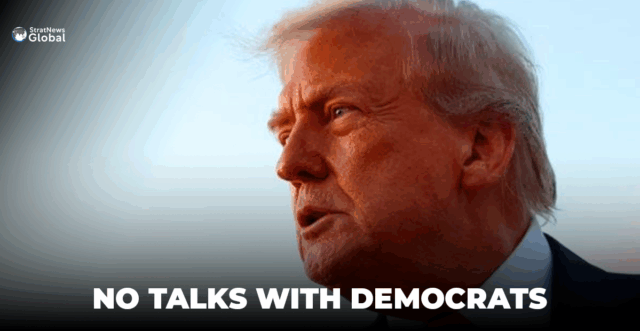U.S. President Donald Trump on Tuesday withdrew from a scheduled discussion with congressional Democrats on government funding, a decision that added to concerns over a possible partial shutdown of government next week.
Democrats and the Republican president postured to try to pin blame on each other for a potential shutdown, which would interfere with a range of federal services and likely furlough hundreds of thousands of federal workers.
“I have decided that no meeting with their congressional leaders could possibly be productive,” Trump wrote in a post on his Truth Social media site.
Senate Democratic Leader Chuck Schumer and House of Representatives Democratic Leader Hakeem Jeffries earlier on Tuesday said Trump had agreed to meet this week at the White House, before government funding expires on September 30.
Potential Shutdown
Lawmakers are at odds over so-called discretionary funding, which accounts for about one-quarter of the roughly $7 trillion federal budget.
“Democrats are ready to work to avoid a shutdown,” Schumer said in a statement responding to Trump’s message. “Trump and Republicans are holding America hostage.”
At issue is how to win enough votes in the deeply divided Congress to pass a stopgap funding bill to keep the government operating into the new fiscal year starting October 1.
Schumer said it is also urgent for Congress to extend an enhanced tax credit for federally backed health insurance premiums, which is due to expire on December 31. Healthcare policy nonprofit KFF estimates out-of-pocket premium payments rising over 75% for the Affordable Care Act plan year beginning on October 1.
“It’s the difference between a family trying to make the mortgage payment and having healthcare,” Schumer told reporters at a press conference in New York’s Brooklyn borough.
Republican leaders say they have not slammed the door on extending the tax credit, but have argued that a stopgap funding bill was not the place to accomplish that.
The Republican-led House passed a bill last week to extend government funding through November 21, but it failed in the Senate where Republicans hold 53 of the 100 seats.
Republican House Speaker Mike Johnson has said he does not intend to call House members back to Washington before October 1 – by which point the government will have shut down absent Senate action.
Johnson says his chamber completed its work when it passed its stopgap funding bill on Friday, a move that also presents the Senate – where bills require bipartisan support to pass – no chance to modify the House bill.
Jeffries told House Democrats to return to Washington from a week-long break on Monday.
Unusual Position For Democrats
In a long posting on Truth Social, Trump attacked Democrats, but said he would meet with the parties’ Leaders “if they get serious about the future of our Nation.”
Without specifically laying out his conditions, Trump said, “All Congressional Democrats want to do is enact Radical Left Policies that nobody voted for — High Taxes, Open Borders, No Consequences for Violent Criminals, Men in Women’s Sports, Taxpayer funded ‘TRANSGENDER’ surgery, and much more.”
Democrats have largely embraced efforts to secure the U.S. border with Mexico, but have criticized Trump’s unilateral tactics of targeting immigrants for deportation without due process. They also have criticized Trump’s use of some states’ National Guard troops in Democratic-controlled cities, ostensibly to reduce crime rates.
Voting against bills to keep the government operating puts Democrats in an unusual position, as Schumer over the years has chastised Republicans for voting against the sort of funding extensions known as continuing resolutions that the House passed last week.
The federal government has partially shut down 14 times since 1981, but it is unclear what operations would continue and what would close on October 1 if government funding runs out since the Office of Management and Budget has not made public agencies’ contingency plans.
Mandatory spending, such as on the Social Security and Medicare benefits would continue, as would interest payments on the federal government’s $37.5 trillion in debt.
(With inputs from Reuters)





